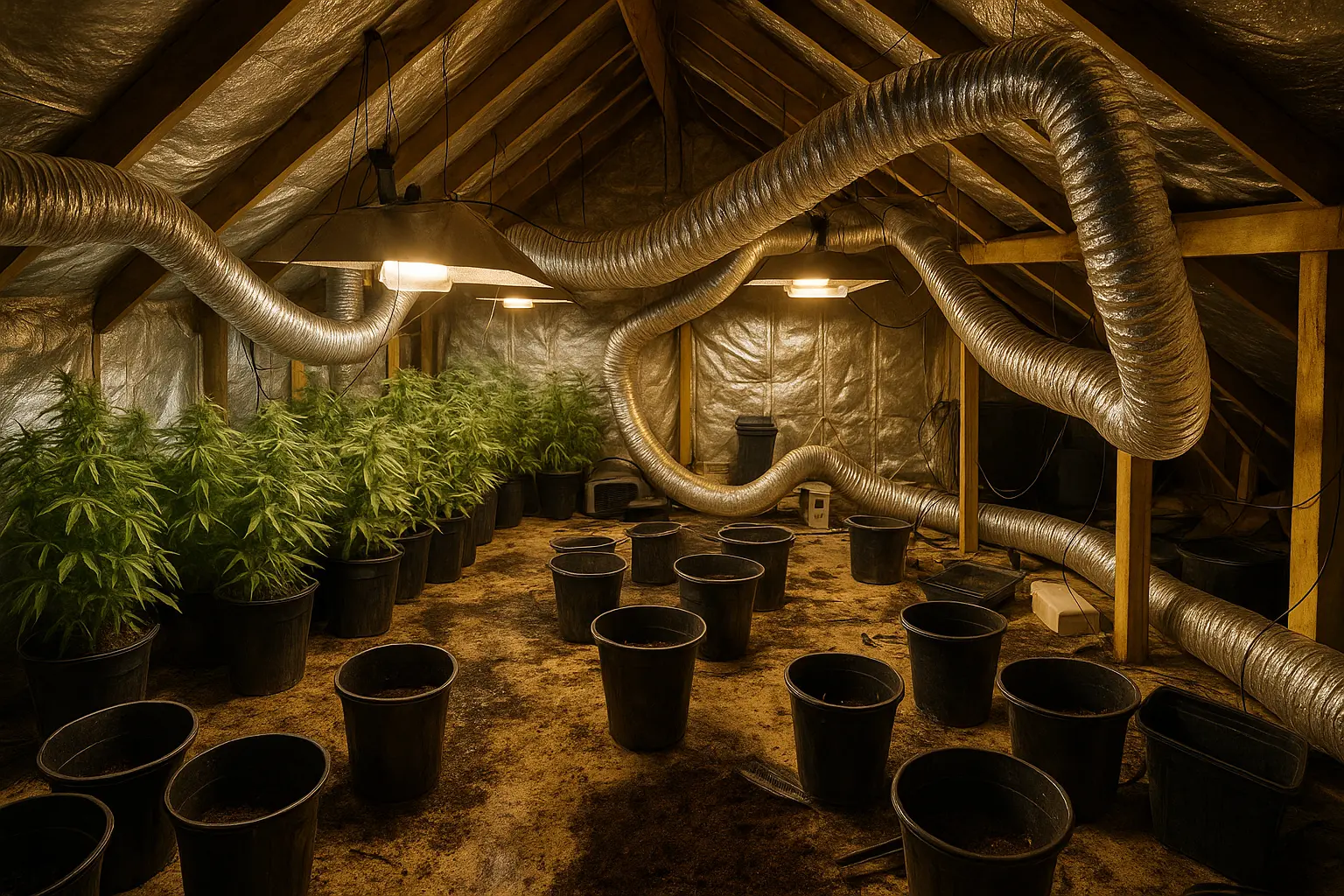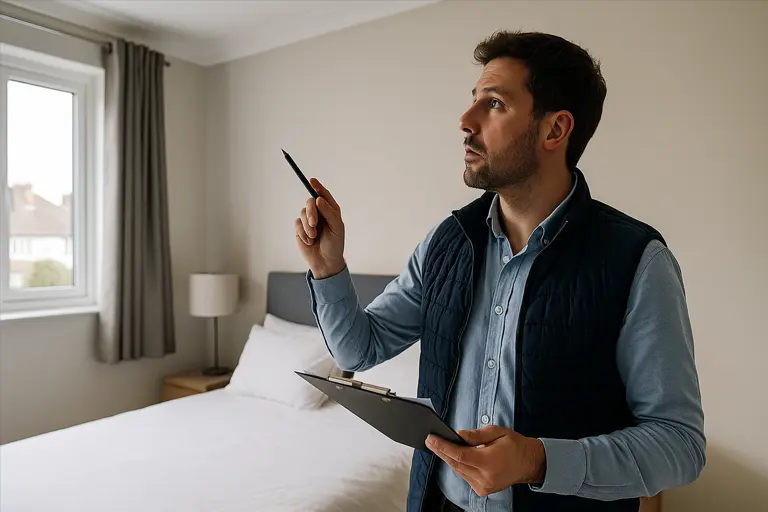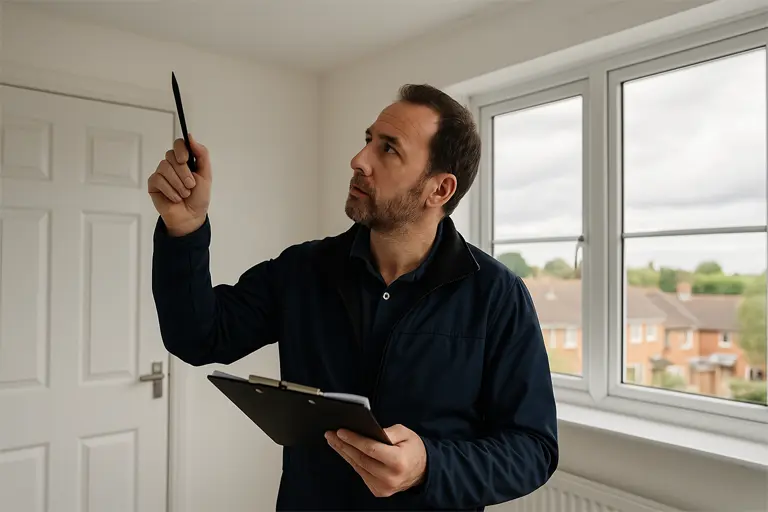When a Rental Property Becomes a Crime Scene
You’ve done your due diligence. References checked. Deposit paid. Tenancy agreement signed.
But months later, you get a call from the police: your rental property has been raided and found to contain a full-scale cannabis cultivation setup. The damage is extensive. The electricity has been bypassed. And your insurer isn’t returning your calls.
This isn’t just a landlord’s nightmare; it’s becoming an increasingly common scenario across the UK.
But here’s the real question: can you, as the landlord, be held liable?
In this article, we explore the legal, financial, and reputational risks landlords face when criminal activity takes place inside their properties, even without their knowledge.
Landlord liability refers to the legal and financial responsibility landlords hold for what happens in or because of their rental properties. While tenants are primarily accountable for their own actions, the law doesn’t give landlords a free pass when illegal activity occurs under their roof, especially when it involves criminal enterprises like cannabis cultivation.
UK legislation places certain duties on landlords to ensure their properties are used lawfully and safely. While landlords aren’t usually criminally charged unless they’re complicit, they can still be:
- Investigated or questioned by police
- Denied insurance payouts
- Sued for negligence or endangerment
- Publicly named in news coverage or council warnings
- Fined for breach of duty of care or property safety
These consequences often stem not from the activity itself, but from the landlord’s lack of oversight, inspection, or intervention.
Landlords are not expected to predict or prevent every illegal act committed by tenants, but they are expected to take reasonable steps to ensure their property is not being used for criminal purposes. UK law outlines several responsibilities that, if neglected, can expose landlords to liability, civil, financial, and reputational.
Here are the key legal areas that affect landlords in these cases:
Misuse of Drugs Act 1971 – Section 8
This is the most commonly cited piece of legislation in cannabis-related property cases.
Section 8 of the Misuse of Drugs Act states that it is an offence for the occupier or manager of premises to knowingly allow the production or supply of controlled drugs.
While the keyword is “knowingly,” landlords can still be investigated if they’ve ignored clear warning signs, failed to inspect the property, or turned a blind eye to tenant behaviour.
Housing Act 2004 – HHSRS & Licensing
The Housing Health and Safety Rating System (HHSRS) requires landlords to maintain properties free from serious hazards. Cannabis farms can cause significant fire risk due to overloaded electrics and illegal wiring, meaning landlords who fail to detect these risks may be in breach of housing safety regulations.
In areas where Selective Licensing applies, landlords have an additional duty to ensure the “good behaviour” of tenants and prevent anti-social or criminal activity within their properties.
Environmental Protection Act 1990
If a cannabis farm results in strong smells, chemical runoff, or mould and damp, neighbours can issue complaints and local authorities may investigate. If landlords haven’t responded to earlier signs or complaints, they could be served with enforcement notices or fines.
Insurance Contracts Act 2015
Landlords are also legally required to take reasonable precautions to protect their property if they want insurance to remain valid. If an insurer believes a landlord did not carry out inspections, ignored damage, or failed to act on red flags, they can deny a claim, leaving the landlord to absorb the full cost of repairs.
In short: Landlords are not liable for criminal acts committed without their knowledge, but they can be held accountable if they fail to manage the property responsibly or act on warning signs.
While tenants are responsible for their actions, landlords are often left to deal with the aftermath of criminal activities. Unfortunately, ignorance of what’s happening inside the property is not a defence in the eyes of insurers or, in some cases, the law. The presence of a cannabis farm can be financially and legally devastating for a property owner.
Here are the key risks landlords face:
🔥 Property Damage
Cannabis cultivation operations often involve extensive structural modifications to create optimal growing environments. This includes removing walls, drilling holes in ceilings for ducting, installing high-wattage lighting systems, and overloading electrical circuits, all of which can result in significant and costly damage. It’s not unusual for properties to suffer from extreme damp, mould, or even fire damage.
🚫 Insurance Refusal
Many landlords assume their insurance will cover any property damage, but this is far from guaranteed. Insurers regularly deny claims if there’s evidence the landlord failed to carry out regular inspections or demonstrate due diligence. In fact, most landlord policies include clauses about illegal activity, and if insurers find the property was being used for criminal purposes, they may void the policy entirely.
A report from Total Landlord Insurance shared a case where a claim for £44,289 was submitted after tenants turned the property into a cannabis farm. The damage included mould, rewiring, and destruction of walls. Without documentation of inspections, landlords are at risk of footing the entire bill themselves.
🧨 Fire and Safety Hazards
Tampered electrics, bypassed meters, and high-energy grow equipment create serious fire risks, not just to the property, but to neighbouring homes. A single fault can result in a house fire, leading to injury or loss of life. This exposes landlords to potential legal liability if it’s shown they didn’t take reasonable steps to inspect and maintain the property.
⚖️ Legal and Reputational Consequences
Landlords can face legal scrutiny if it appears they neglected their duty of care. Even if prosecution is unlikely, civil claims and reputational damage are very real risks. Local authorities may also place properties under increased scrutiny, making future lettings more complicated.
📉 Decreased Property Value
Properties that have been used as cannabis farms are often stigmatized, even after remediation. This can reduce sale value, scare off prospective tenants, and increase time on the market.
| Risk Type | Example Impact | Estimated Cost Range |
|---|---|---|
| Fire Damage | Electrical fire caused by tampering | £10,000 – £50,000 |
| Insurance Rejection | Claim denied due to lack of checks | Full cost to landlord |
| Structural Damage | Walls removed or ceilings collapsed | £5,000 – £20,000 |
| Legal Liability | Failure to demonstrate due diligence | £1,000+ in legal fees |
| Loss of Rent | Eviction process and property remediation | £2,000 – £10,000 |
| Reputational Damage | Letting agent or public reviews | Long-term letting impact |
In short, cannabis farms are not just a problem for the police, they’re a serious and growing threat for landlords who fail to maintain a proactive approach to property management.

Signs Your Property May Be at Risk
Cannabis cultivators often target rental properties, especially those that are poorly managed or infrequently inspected. Recognising early warning signs can help landlords prevent illegal activities and protect their investments.
Tenant Behaviour Red Flags
- Unusual Payment Methods: Tenants offering to pay several months’ rent upfront in cash may be attempting to avoid standard vetting procedures.
- Avoidance of Inspections: Repeatedly declining property inspections or maintenance visits can indicate illicit activities inside the property.
- Requesting Immediate Occupancy: Tenants eager to move in without proper referencing may have ulterior motives.
Physical Indicators
- Blacked-Out Windows: Consistently covered windows with curtains or reflective materials can conceal grow operations.
- Strong Odours: A persistent, sweet, and pungent smell may indicate cannabis cultivation.
- High Humidity and Condensation: Excessive moisture on windows and walls can result from indoor plant growth.
- Electrical Modifications: Unusual wiring or tampered meters suggest attempts to bypass electricity usage monitoring.
Property Alterations
- Structural Changes: Unauthorised modifications, such as removed walls or added ventilation systems, can be signs of a grow operation.
- Excessive Security Measures: Installation of surveillance cameras or reinforced doors may indicate illicit activities.
Community Observations
- Unusual Activity: Frequent visitors at odd hours or tenants rarely seen can raise suspicions.
- Community Reports: Neighbours reporting unusual smells or behaviours should be taken seriously.
Being vigilant and conducting regular inspections can help landlords detect and address these warning signs promptly.
professional Property Inspections
Stay compliant, avoid costly surprises, and protect your property from just £30 + VAT.
Get started with a free consultation today.
How Landlords Can Protect Themselves
While landlords may not always be able to prevent illegal activity, they can take proactive steps to reduce the risk of liability and financial loss. Here are key protection strategies that responsible landlords should adopt:
- Rigorous Tenant Vetting
The first and most crucial line of defence is who you allow into your property.
- Run full credit and background checks.
- Always ask for proof of income and employment.
- Contact multiple references (and not just friends).
- Be wary of tenants offering to pay several months upfront or avoiding documentation.
Why it matters: Many cannabis farms are set up using fake identities or front tenants acting for organised gangs.
- Include Clauses in the Tenancy Agreement
A well-drafted tenancy agreement can strengthen your legal position if something goes wrong.
- Explicitly forbid illegal activities, including drug production.
- Insert clauses about regular property inspections and access rights.
- Require tenant cooperation with periodic checks.
Why it matters: Clear terms create accountability and support your case if legal or insurance disputes arise.
- Schedule Regular Inspections
Inspections are the single most effective method for early detection of cannabis farms.
- Carry out a property inspection every 3–6 months.
- Provide proper notice and document all visits.
- Look for condensation, smells, blacked-out windows, or DIY electrical work.
Why it matters: Regular inspections help demonstrate due diligence, a key factor in avoiding liability.
- Use a Trusted Letting Agent or Outsourced Inspection Service
Many landlords struggle to manage inspections personally, especially if they own multiple properties or live far away.
- Choose agents with proven inspection routines.
- Alternatively, use a third-party property inspection company with trained professionals.
- Consider services with photographic reporting and timestamped logs.
Why it matters: You get professional oversight and evidence that you’re fulfilling your landlord responsibilities.
- Maintain Strong Communication Channels
Check in with tenants periodically, especially if you don’t hear from them for long periods.
- Ask casual questions about maintenance or the property condition.
- Encourage neighbours to raise concerns.
- Log all communications to build a clear audit trail.
Why it matters: Staying connected reduces the likelihood of tenants attempting illegal activity undetected.
Landlord Protection Methods
| Protection Measure | Risk Reduced | Additional Benefit |
|---|---|---|
| Tenant Referencing & ID Checks | Fraudulent tenancy, front tenants | Legal protection and eligibility proof |
| Regular Property Inspections | Cannabis farms, subletting | Supports insurance claims & licensing |
| Tenancy Agreement Clauses | Unauthorised activity | Easier legal enforcement |
| Outsourced Inspection Services | Lack of oversight in remote properties | Reliable third-party evidence |
| Strong Communication & Follow-up | Tenant isolation, complaints ignored | Builds landlord-tenant transparency |
What to Do If You Discover a Cannabis Farm
Discovering a cannabis cultivation operation in your rental property is alarming, but how you respond can protect you legally and financially. It’s vital to stay calm, follow the correct procedure, and ensure your own safety first.
Do Not Confront the Tenants
Your immediate instinct might be to speak to the tenant or investigate further. Don’t.
- Cannabis cultivation is often linked to organised crime.
- Growers may react aggressively to protect the operation.
- Confrontation could put you at serious personal risk.
What to do instead: Leave the property and avoid alerting the tenant. Your safety is the priority.
Contact the Police Immediately
If you suspect a grow is taking place, either from inspection signs or neighbour reports, contact local police.
- Call 101 (non-emergency) or 999 if you believe there is immediate danger.
- Report the suspected drug production clearly.
- Provide any evidence, such as photos or inspection logs.
Why it matters: The police are trained to handle these situations and will act accordingly.
Document Everything
Your next step should be to create a paper trail.
- Record the date and time of discovery or suspicion.
- Note down the signs observed (e.g. smell, electrical tampering).
- Keep any inspection reports, photos, or neighbour messages.
Why it matters: This documentation can protect you against legal claims and is often required by insurers.
Notify Your Letting Agent or Property Manager
If you’re working through a letting agent, inform them immediately.
- Ask them to initiate their own report.
- Make sure they follow up with the police and document it.
Why it matters: It shows you’re not ignoring the issue and brings additional witnesses into the process.
Contact Your Insurer
Even if damage hasn’t yet occurred, alert your insurer to the situation.
- Ask them what information they need if a claim becomes necessary.
- Provide your inspection records or tenancy agreement if requested.
Why it matters: Early communication avoids surprises if you need to make a claim later
Arrange a Full Property Inspection
Once the police have secured the scene, arrange a professional inspection.
- Assess damage to wiring, insulation, walls, etc.
- Identify any safety hazards from chemicals or fire risks.
- Secure the property to prevent re-entry.
Why it matters: You’ll need a complete report for repairs, insurance, and legal purposes.
Step-by-Step Action Plan
| Step | Purpose | Notes |
|---|---|---|
| Do Not Confront Tenants | Safety first | Avoid escalation or violence |
| Contact Police | Legal handling of criminal activity | Use 101 or 999 depending on urgency |
| Document Observations | Evidence for legal/insurance protection | Include photos, dates, and descriptions |
| Notify Letting Agent | Ensures professional process and witnesses | Keep email records |
| Contact Insurer | Prepares for potential claim | Ask about specific policy requirements |
| Arrange Inspection | Assess damage and next steps | Use a trained professional or your provider |
Property inspection Service
Stay compliant, avoid costly surprises, and protect your property from just £30 + VAT.
Get started with a free consultation today.
Awareness, Action, and Accountability
The rise of cannabis cultivation in UK rental properties is more than a criminal nuisance, it’s a serious risk for landlords. While the law recognises that landlords can’t control every tenant’s action, it does expect them to act responsibly and take every opportunity to prevent their properties from being used illegally.
That means:
✅ Vetting tenants thoroughly
✅ Carrying out regular inspections
✅ Responding to red flags
✅ Having clear documentation
✅ Acting fast if something seems wrong
Landlords who fail to do these things may not face jail time, but they could lose thousands in damages, insurance claims, and legal fees. Worse still, they could be held responsible for harm caused to neighbouring homes or innocent people.
In short: Landlord liability is real, but so is landlord protection.
By staying proactive, informed, and connected, you can significantly reduce your risk and ensure your property doesn’t become the next front for organised crime.
Frequently Asked Questions About Cannabis & Property Inspections (PIs)
Can landlords be prosecuted for cannabis farms in their properties?
While landlords are rarely criminally prosecuted unless they are directly involved, they can face investigations, fines, and enforcement action if they are found to have ignored signs or failed to carry out inspections.
What legal responsibilities do landlords have to prevent cannabis cultivation?
Landlords are expected to take reasonable steps to ensure their property is not used for illegal activity, including vetting tenants, carrying out inspections, and responding to reports or red flags.
Will insurance cover damage caused by a cannabis farm?
Only if the landlord can prove they took reasonable precautions, such as conducting regular property inspections and not knowingly allowing criminal activity.
How can landlords spot a cannabis farm early?
Common signs include blacked-out windows, strong odours, excessive condensation, tampered electrics, and tenants avoiding inspections or neighbours.
Are landlords liable for electricity tampering by tenants?
If the landlord failed to inspect the property or notice red flags, they may be held partly liable, especially if the tampering results in fire or injury.
Can I evict a tenant if I suspect a cannabis farm?
Yes, but the process must follow legal procedures. If there is evidence of criminal activity, contact the police first, then seek legal advice or work with a solicitor to begin eviction proceedings.
How often should I inspect my rental property to avoid liability?
Ideally every 3 to 6 months, depending on the tenancy agreement and local licensing conditions. Inspections should be documented with photos and timestamps.
What happens if I ignore a neighbour’s complaint about smells or noise?
Ignoring complaints may be seen as negligence. Councils or insurers may argue that the landlord failed in their duty of care, especially if the complaint was valid.
Can I outsource property inspections to a third-party company?
Yes, and doing so can enhance your compliance, especially if you live far from the property or manage a large portfolio. Professional inspections provide reliable documentation and risk management.
Are cannabis farms in rental homes a growing problem in the UK?
Yes. Police across the UK report hundreds of raids each year, with many operations hidden in ordinary-looking rented homes, particularly in areas with low inspection oversight.
What should I do if I suspect a cannabis farm in my rental property?
Do not confront the tenants. Contact the police immediately, document your observations, and inform your letting agent or insurer. Your safety is the priority.
Can I be fined for failing to inspect my property regularly?
Yes, in some areas under Selective Licensing Schemes, landlords can be fined or even lose their licence if they fail to demonstrate active property management.



